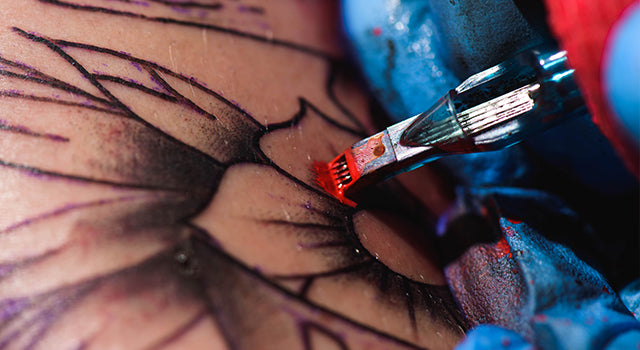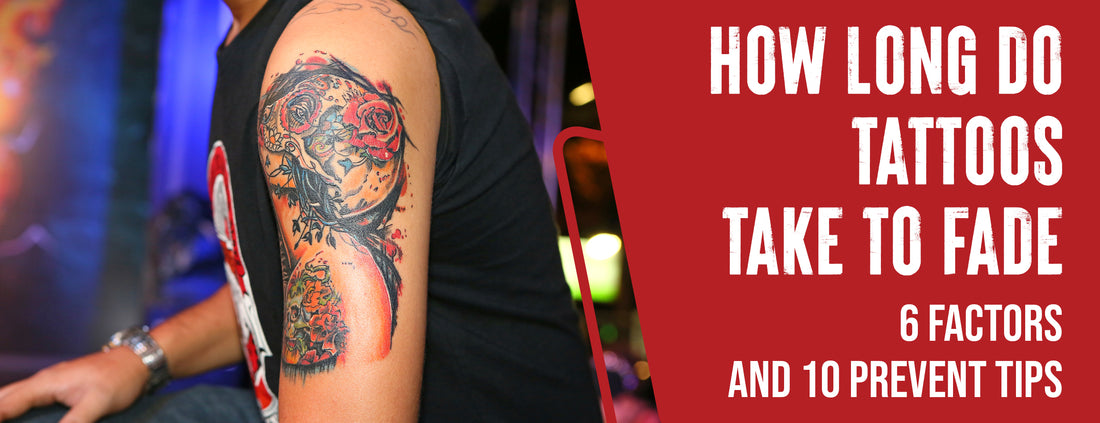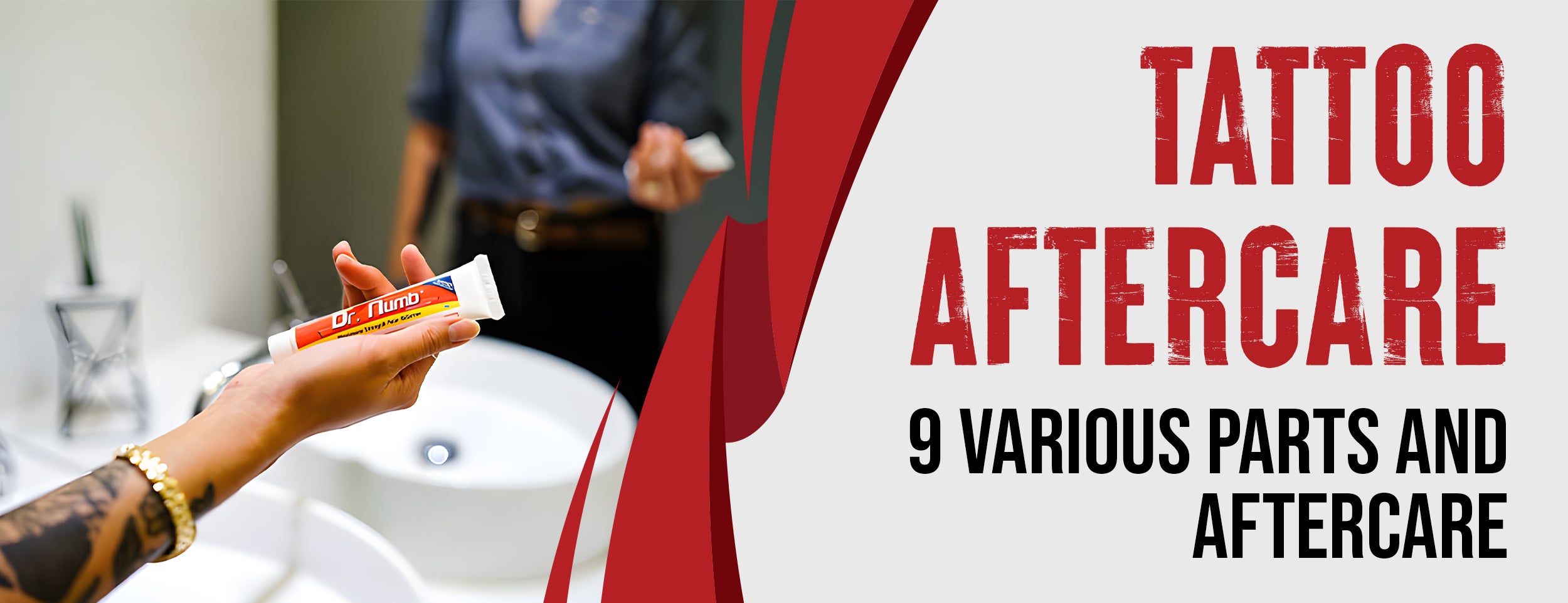A lack of proper after-care can lead to infection and scarring during tattoo healing, which can cause the color to fade faster or the intensity to reduce immediately. A faded tattoo design adversely affects the appearance and clarity of the invention, causing some people to regret their choice.
After getting a tattoo, settling slightly within the first six months is typical. Depending on the person's style, location, and lifestyle, a tattoo may show signs of fading as early as two to five years, but most tattoos won't show significant fading for 10 to 20 years.
In this blog post, we will explain the factors influencing how long tattoos last, long-lasting tattoo placements, long-lasting tattoo styles, and tips for preventing tattoos from fading.
How Long Do Tattoos Take To Fade: 6 Factors that Influence

Several elements significantly affect how long your tattoos fade. These factors can help you maintain the vibrancy and longevity of your tattoo art.
- Tattoo Placement Matters: Like in real estate, location is critical regarding tattoos. Tattoo placements less exposed to daily wear and tear often age more gracefully. Everyday actions like washing your hands, sunbathing, or clothing friction could cause tattoos to fade faster. Tattoos in areas prone to bloating or sweat can also become distorted.
- Choosing the Right Ink Colour: Regarding the tenacity of color, darker pigment shades have superior staying power. Thus, tattoos with darker colors may fade slower than those with lighter hues. An incorrect choice of ink color may cause an early fading of the tattoo.
- Size & Style of the Tattoo: Larger tattoos are more likely to age well than smaller designs. Regarding style, tattoos with bolder lines and details stay vibrant longer. Intricate tattoos maintain their design integrity more efficiently throughout the years than minimalist-style tattoos.
- Importance of After-Care: A well-followed-care routine highly influences how your tattoo will look directly after healing and in the following decades. Neglecting after-care can lead to infections and scarring during tattoo healing, diminishing color intensity and leading to early ink fading.
- Protecting your Tattoos from Sun Exposure: One critical aspect of tattoo after-care is protecting your artwork from the sun. Excessive sun exposure can fade the ink faster, making your tattoo look dull and aged.
- Healthy Lifestyle Habits: Healthy lifestyles are essential to keep your tattoos fresh and vibrant. This includes routine moisturization, plenty of water, eating a nutrient-rich diet, and avoiding smoking. These habits contribute to skin health, affecting your tattoo's appearance and longevity.
Tattoo Placements that Last a Long Time

Choosing the right spot on your body for your new tattoo is essential, regardless of whether you are a tattoo novice or a veteran. Here, we'll discuss the longevity of tattoos on different body parts and why some tattoos seem to fade quicker than others.
Shoulder and Upper Arm Tattoos
Tattoos on the shoulder and upper arm are popular because of their versatility. You can easily show them off or conceal them based on your outfit or occasion. These areas are also less subjected to friction, sunlight exposure, and significant weight fluctuation, helping your tattoo maintain its original vibrancy for longer.

Back & Neck Tattoos
Ink on the top and center of the back and behind the neck is less likely to fade quickly. These areas face less sunlight and friction than other parts of the body. Plus, they're less prone to weight changes. The skin here also remains smoother as we age, which can keep your tattoo looking new longer.
Upper Rib Cage and Inner Forearm Tattoos
The upper rib cage and inner forearms, while slightly more sensitive to tattooing because of the thin layer of skin, are other great locations for long-lasting tattoos. These areas are typically covered by clothing, protecting the ink from sun damage and friction.
Thighs and Calves Tattoos
Though they may get more sun exposure in the warmer months, upper thighs (front & sides) and calves can make brilliant spots for tattoos. Their relatively stable skin conditions allow tattoos to stay vibrant for an extended period. Regular sunscreen application can shield these tattoos from the harmful effects of sun rays.
Styles For Tattoos That Last a Long Time

The tattoo is an artistic expression of one's personality, so choosing a style that ages well is essential. Several key design styles are known for their long-lasting appeal and lesser tendency to fade. Some types are notorious for maintaining their visual charm:
- Blackwork Tattoos: As the name suggests, these tattoos are all about bold, black ink. The heavy saturation of black makes these tattoos less prone to fading, ensuring they look great for a long time.
- Black & Grey Tattoos: This style blends black and grey inks to create detailed designs. These tattoos are known for longevity because black and grey inks hold up well.
- Tribal Tattoos: Tribal tattoo designs often use black ink and include intricate lines and shapes. These tattoos are deeply injected into the skin, revealing bold and lasting designs.
- Greyscale Tattoos: Similar to black and grey tattoos, Greyscale tattoos feature shades of grey to create impressive, detailed art pieces. Deep ink into the skin helps these tattoos maintain their original design and resist fading.
- Dotwork Tattoos: Dotwork tattoos are created using tiny dots to form highly detailed images. Tattoos with these designs have a long lifespan, especially those in black and grey ink.
- American Traditional Tattoos: These tattoos are known for their bold lines and vibrant colors. Despite vibrant colors, these tattoos age relatively well, with deep ink injection and more extensive coverage areas.

Longevity of Small Tattoos
We must recognize the importance of size when discussing how long tattoos last. Indeed, small tattoos may not stand the test of time as robustly as larger ones, but it's pretty simple. There are several essential factors to remember:
- Understanding the correlation: The relationship between a tattoo's size and how gracefully it ages is only sometimes straightforward. Small and delicate tattoos can still hold up well, provided they're well-cared for.
- The impact of trendy and minimalist designs: These fashion-forward tattoos, such as petite tattoos or ones done in a minimalist style, are prone to aging less elegantly. Every detail in these designs is under the microscope, highlighting even the most minor imperfections.
- Larger pieces and bold lifework: Tattoos with thicker lines or larger designs fare better. Even a slight blurring or fading can still leave these tattoos looking distinct and clear.
- Fine line tattoos and their fading prospects: Tattoos with fine lines often fade quicker than traditional tattoos. This is because the ink is not as densely distributed under the skin.
Tattoo After-Care Stages: 4 Key to Long-Lasting Art

A tattoo can be an exciting experience, but how you care for it can determine how it will look years later. Tattoos that aren't correctly taken care of may be more likely to fade prematurely and suffer from uneven lifework. By heeding your tattoo artist's advice and using these methods, you can ensure that your tattoo remains colorful and detailed.
- Follow Tattoo Hygiene: Your tattoo artist will provide precise instructions for after-care. Do you have questions about these guidelines? They're crucial for avoiding infection and ensuring clean tattoo lines.
- Educate Yourself: Research tattoo after-care to supplement guidance from your artist. This will help you understand what to expect during the healing process and when to take specific steps, such as when it's safe to remove the bandage from a newly inked tattoo.
- Cleanse & Moisturize Regularly: For the first month after receiving your tattoo, cleanse and moisturize it twice daily. This can help speed up wound healing, reduce inflammation, and keep your tattoo looking its best. It is essential to use a gentle and fragrance-free soap to avoid irritating the new ink.
- Use topical foam soap: While any non-scented lotion can moisturize a healing tattoo, Dr. Numb foam soap is specifically designed for tattoo after-care. Calendula oil, grapefruit essential oil, aloe vera, and shea butter moisturize and soothe the skin. It also includes sunflower seed oil, which can help brighten the tattoo and promote long-lasting pigment retention.
10 Best Tips To Prevent Tattoo Fading

The exact timeline for this process varies. Factors such as sun exposure, skincare, lifestyle choices, and other aspects are critical. Here is more about how to prevent your tattoos from fading:
Avoid Sun Exposure
Sunlight is the primary culprit behind visible tattoo fading, particularly its UVA rays. It promotes free radicals that break down tattoo pigments, reducing your tattoo's vibrancy. Always shelter your tattoo from the sun, especially during the first 4-6 weeks of healing. When you step outside, using a sunscreen of at least SPF 50 is a must.
Skincare Routine
A good skincare routine helps maintain the luster of your tattoos. Dry or undernourished skin encourages ink distortion and tattoo fading. To avoid such issues, moisturize your skin frequently with a tattoo-focused lotion like Dr. Numb foam soap to fortify your skin barrier and reduce inflammation.

Healthy Lifestyle Habits
Your lifestyle choices significantly affect the longevity of your tattoos. Maintain a healthy diet, hydrate yourself frequently, and exercise often. Avoid smoking, excessive alcohol or caffeine, and especially tanning beds. Note that large weight fluctuations can warp the appearance of your tattoo. Hence, keep a check on your diet and exercise regularly.
Incorporate Vitamins
Vitamins A, C, D, and E prevent skin sagging, a significant cause of tattoo fading. You should include these vitamins in your diet and skincare routines to keep your tattoo vivid and fresh.
New Tattoo Care

A well-healed tattoo is easy to maintain. Developing a proper aftercare routine from the beginning can enhance the longevity of your ink. Avoid scratching or picking at the scabbing and peeling skin, as it can lead to problems like a distorted image, slower healing, scarring, and potential infections.
Consider Tattoo Placement
Placement plays a crucial part in the life of your tattoo. Areas of your body that experience less friction, like the back of your neck, may have tattoos that last longer than parts like your palms and feet.
Avoid Smoking
Smoking has a detrimental effect not only on your overall health but also on your tattoos. You may notice that your tattoo fades more quickly due to it. When you smoke, your skin loses elasticity because it reduces collagen production.
If your skin elasticity is low, your ink will likely bleed out. When smoke enters your body, your blood vessels constrict, slowing the healing process, increasing the risk of infection, and causing scarring.

Wear Protective Clothing and Products Outside
At the very least, it is recommended that you wear sunscreen, preferably covered by loose clothing or some form of covering. It's challenging to reapply sunscreen repeatedly, so do your best to do so as often as possible. An SPF with mineral-based ingredients that are tattoo-friendly can extend the life of your tattoo.
Avoid Prolonged Water and Chemical Exposure
Pools, hot tubs, and oceans can cause tattoo fading because of chemicals like chlorine and excessive salt. Cools and hot tubs contain chemicals like chlorine that can cause color distortion, fading, and irritated skin.
As the seawater dries out the skin, it can cause many of the same effects, including itchiness and scabbing. Excessive moisture can prolong the healing of your tattoo by softening the scabs that form during the healing process. Limit or skip out on these activities if you have a new tattoo.
Choose a Professional Tattoo Artist

Finding a skilled tattoo artist is essential if you want your tattoo to age well. Being a professional tattoo artist requires more than just being good at drawing and owning a tattoo gun. Apprenticeship alone can take six months to several years, and becoming a well-known name in the industry can take even longer.
The longevity of your tattoo depends on several factors, such as where it is placed, the color of the ink, the size and style of the tattoo, and how well you take care of it afterward. Protecting your tattoo from the sun and living a healthy lifestyle will help your tattoo last longer.
So, if you're considering getting a new tattoo, remember that its longevity is ultimately up to you. With proper care, your tattoo can remain vibrant for many years.

Conclusion
Tattoos last a long time if you take care of them. From the location you choose to get inked to the color of the ink, the size and style of your design, and how well you care for it afterward. All these factors significantly contribute to your tattoo's lifespan.
Implementing healthy lifestyle choices and protecting your tattoo from the damaging effects of the sun can also prolong your tattoo's vibrancy. The hands that create the masterpiece play a crucial role, too, so choosing a professional tattoo artist is paramount. Remember, with correct care, your tattoo is not just a mere body marking but a lifelong piece of art.













![Antibiotics and Tattoos: 3 Risks and 3 Effects [with 4 Precautions]](http://drnumb.com/cdn/shop/articles/Can_You_Get_Tattooed_On_Antibiotics__3_Risks_and_3_Effects_4_Precautions.jpg?v=1714128292)

